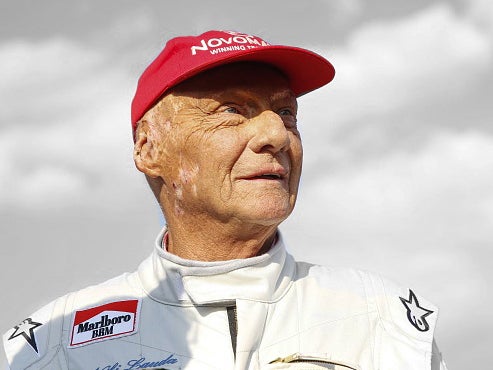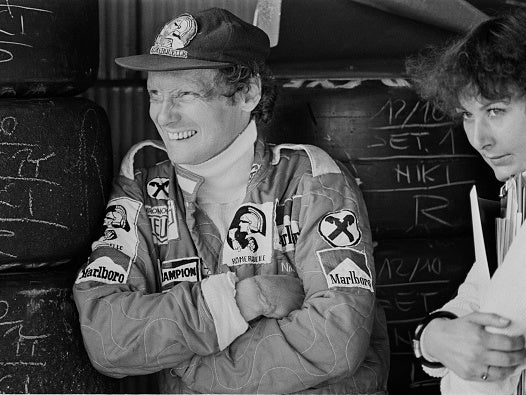Niki Lauda’s magic touched all corners of Formula One and his remarkable legacy continues to live on
One of the greatest F1 drivers in history, Lauda was resilient, honest and successful in all walks of life
“When I looked at it, I thought ‘Bah! I must have really been an asshole in the past’.” These are the words of Niki Lauda, shortly after watching Daniel Bruhl’s depiction of himself in the 2013 Hollywood film ‘Rush’. Lauda later admitted he was worried about how viewers would react to how he was portrayed by Bruhl, who he formed a close bond with during filming to help him learn the complicated ways of an F1 driver. But he need not have worried.
On Monday night, Niki Lauda died at the age of 70. A three-time Formula One world champion who should have been a four-time world champion had it not been for his nearly-fatal accident at the Nurburgring in 1976, Lauda was straight-talking, honest, successful in all walks of life and perhaps the wittiest driver of his generation.
Lauda was never afraid to say what needed to be said, or swear live on television as so many broadcasters discovered over the years, and although this riled many of his competitors in the 1970s and 1980s - in particular James Hunt during that 1976 season - it led to him being adored by many.
When the news of Lauda’s death at the University Hospital in Zurich was announced by Dr Walter Klepetko - the man who helped perform a lung transplant on Lauda in Vienna last August - it said plenty about Lauda’s career that immediate tributes came from Ferrari, McLaren and Mercedes. Lauda ended Ferrari’s 11-year wait for the world championship in 1975 when he secured nine of 14 available pole positions, equalling the record set by Ronnie Peterson the previous season. No other driver managed to beat that record until Ayrton Senna’s dominant 1988 tally of 13.
Had Lauda not experienced one of F1’s most memorable crashes, he would surely be one of just four men to win three consecutive world championships, joining Juan Manuel Fangio before him and Michael Schumacher and Sebastian Vettel after. Sandwiched between his 1975 and 1977 triumphs came the career-defining 1976 campaign - not just because of his battle with Hunt or his fiery crash on the Nordschleife track, but because of the way his sheer defiance to win saw the Austrian fight through the pain barrier to return to racing just 40 days later.
Not many drivers who crashed so ferociously in the 1970s lived to tell the tale, nor did they choose after receiving their last rites to return to the cockpit. But not many drivers shared the same desire as Lauda; that desire to beat Hunt and prove he was the best of his generation.
Despite missing the Austrian and Dutch Grands Prix due to his life-threatening injuries, Lauda returned and led the championship by three points going into the final race of the season in Fuji, Japan. But the fire that left Lauda with first-to-third degree burns to his face, head and lungs had not only changed his appearance, but it changed his outlook on racing. Where he decided against withdrawing from the German Grand Prix due to the wet conditions, Lauda decided at Fuji that he was not willing to risk his life again, and withdrew at the end of the second lap to cost himself the title.

Time away from the sport after his first retirement in 1980 brought success off the track as Lauda became a flourishing businessman and set up his own airline, before returning to F1 with the most lucrative contract the sport had seen in 1982 and, to cement his greatness behind the wheel, a third world championship in 1984.
But Lauda’s magical touch on the sport didn’t end there and, fittingly, will not end with his passing either. Mathias Lauda, one of his two sons with first wife Marlene, continues to race in the World Endurance Championship with his brother Lucas as his manager, while there will be numerous tributes to the Austrian at this weekend’s Monaco Grand Prix.

Yet the biggest sign of his legacy comes at the front of the current F1 grid. In his role as non-executive chairman of Mercedes’ all-conquering outfit, it was Lauda who talked Lewis Hamilton into leaving McLaren for the German team because, simply put, Lauda believed they would be the best. Not for the first time in his life, Lauda made the right decision.
But the ill-health caused from the 1976 accident continued to follow him as he underwent kidney transplants in 1997 and 2005, donated by his brother Florian and second wife Birgit respectively, before last year’s lung transplant finally took him away from the paddock for the final time. But whether it was 1980, 1985, 2018 or Monday 20 May 2019, the great Niki Lauda never really left Formula One.
Join our commenting forum
Join thought-provoking conversations, follow other Independent readers and see their replies
Comments
Bookmark popover
Removed from bookmarks